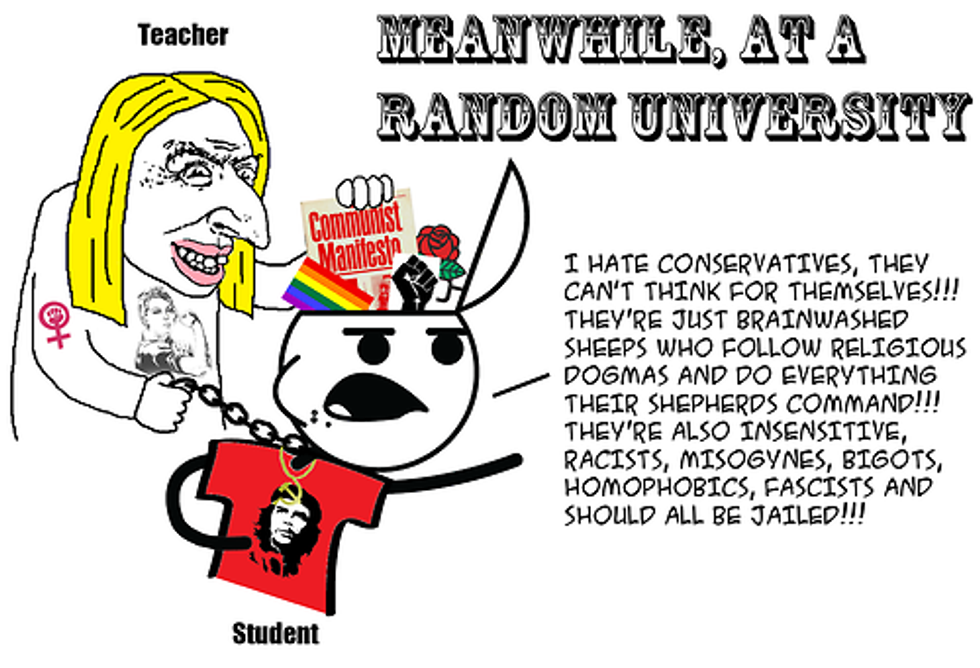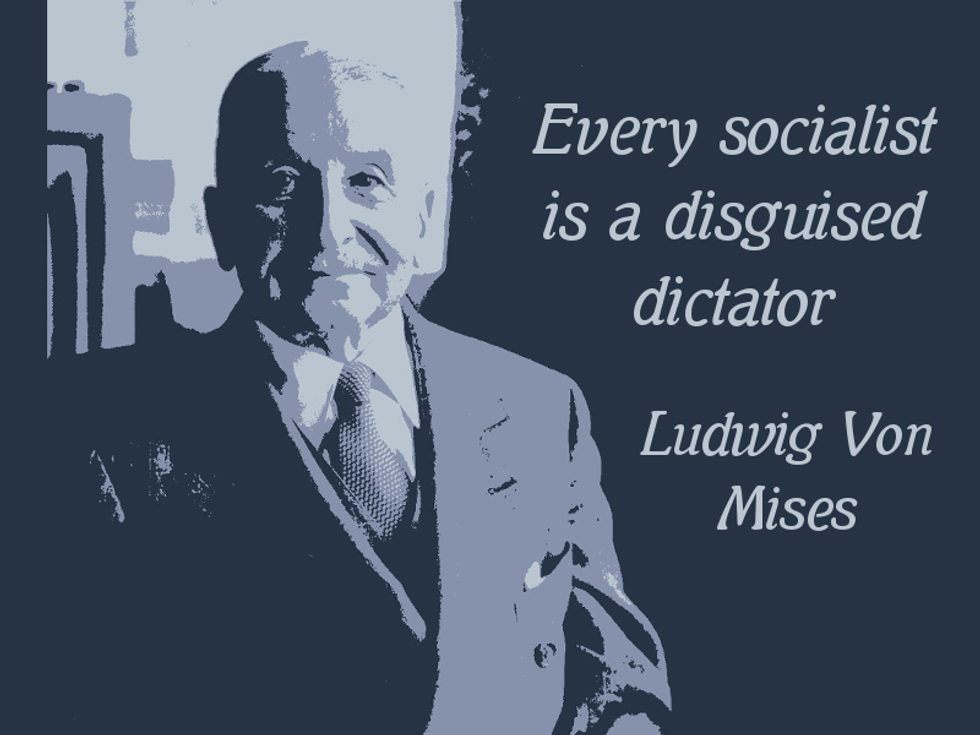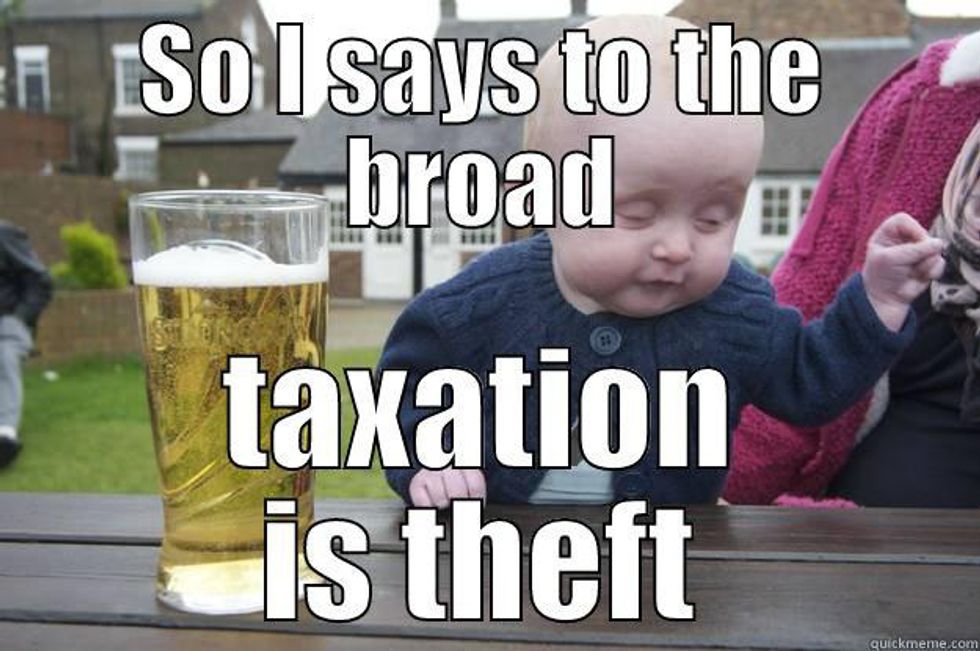In part one of this series, I provided a basic introduction to the “anarchist” and “voluntaryist” ideologies. In part two, I examined the inevitable end of statism, otherwise known as democide. In part three, I refuted the most common arguments against anarchism, and in this edition, I will provide an anarchist’s perspective on the institution of higher education.
Let’s get started.
Recommended for you
Growing up, I was well aware that college was predominantly a progressive institution. My fears have been confirmed, and to a level that I could have never imagined — this is why I now call it “higher-level indoctrination.”
Higher-level indoctrination is claimed to be one of the most important institutions around today. It is supposedly a place where intellectualism flourishes, ideas are challenged in a respectful manner and preparation for lifelong careers takes place. For those reasons and others, “regressives” like Barnie Sandlers support the idea of student loan debt forgiveness and “free college,” regardless of the moral and economic implications of those policies.
For the past year and change, I have been documenting my experiences at Heartland Community College and Illinois State University, in a series titled, "Adventures in Illinois Higher Education" (AIHE). To date, there are a total of 16 editions, and it is ongoing.
The fall semester of 2015 makes up the majority of articles in the AIHE series, and for good reason. Although, there is one day in college that is more vivid than any of the others.
It was the second day of my sociology class, and my teacher actually had the audacity to praise Karl Marx and promote the totalitarian ideology of communism. Although, she did add the caveat that governments and human nature tend to get in the way of this “utopia.”
Tangentially, she is correct — when you centralize every facet of life under the government, bad things are guaranteed to happen. As early libertarian Lord Acton once said, “Power tends to corrupt, and absolute power corrupts absolutely.”
That said, I’m sure that her position was not surprising for most, but I just didn’t think it would be so brazen.
Another example comes to mind, this one in my American Government and Politics class. The discussion was regarding the “best economic system,” and his recommendation was less surprising than the last. He claimed that the perfect system is the correct blend of free market capitalism and communism. I think Ludwig von Mises had something to say about that in his magnum opus, "Human Action."
“The market economy or capitalist, as it is usually called, and the socialist economy preclude one another. There is no mixture of the two systems possible or thinkable; there is no such thing as a mixed economy, a system that would be in part capitalistic and in part socialist. Production is directed either by the market or by the decrees of a production tsar or a committee of production tsars.”
To put it another way, you either own your person and the fruits of your labor or you don’t.
There is also one other important aspect of the communist indoctrination, and that is the Marxist influence within higher-level institutions. Some call it “political correctness,” but I prefer to call it what it is: cultural Marxism.
Cultural Marxists “…place great emphasis on analyzing, controlling, and changing the popular culture, the popular discourse, the mass media, and the language itself…Cultural Marxists themselves try to remove these inequalities by more or less subtle manipulation and censorship of culture.”
This idea has essentially taken over higher-level institutions, in the form of the victim mentality. A few examples of this would be “white/male privilege,” “safe spaces” to shelter grown adults from free speech and much more.
This irrational focus on egalitarianism has had dangerous results worldwide, ranging from the pussification of society, all the way to already debunked economic policies.
This has also lead to the shutting down of dissenting opinions, by way of censorship or pejoratives such as, “racist,” “misogynist,” “homophobe," etc.
Conclusion
What I’ve personally witnessed in higher-level indoctrination is nothing short of impressive. I only provided a couple of the more atrocious examples, but I think you get the point (if you don’t, check out the entire AIHE series for all of the gory details).
The dangers of collectivism have been demonstrated empirically throughout history, and that is the atmosphere that higher-level indoctrination breeds — that, and a disdain for individuality. People want to “fit in," “party” and “get laid” (I didn’t include “get educated” on that list, because they really aren’t getting an “education”). The collectivistic part is bad enough, but once you toss in a socialist demagogue, things escalate quite rapidly.
I also believe a case could be made for widespread moral relativism within college campuses; therefore, virtue can never truly be known universally. I think this is further confirmed when considering that it is the default ethical position for college students, as stated by Russ Shafer-Landau, Director of the Parr Center for Ethics.
All of the things discussed previously show an obvious detachment from reality. I propose that this is caused by the preference of emotion over logic. Whether it is ad hominem, strawman or red herring logical fallacies committed in Facebook debates, the clamoring for the dangerous ideologies of socialism or communism, or the inclination to create “new” genders out of thin air (ignoring biology), rational discourse is shut down one way or another; although, I suppose those of us who value logic should be thankful we haven’t had urine poured on us for stating the bleeding obvious.
As an anarchist, there are also the moral and economic implications when it comes to publicly funded universities, as well as the proposals for “free college.” It should be obvious that there is no such thing as a free lunch — even if you, the college student, aren’t footing the bill, someone else is being coerced to pay for your overpriced education. To put it more simply, taxation is theft, regardless of what the money is being used for.
In closing, I have personally learned far more through my own self-education, whether that is in the field of economics, philosophy, politics or history. I understand college will be a required step for some (as it is for me), but that doesn’t mean your “education” should begin and end there. Knowledge has never been cheaper, thanks to technology; instead of spending all of your free time playing Pokemon Go, consider reading a book.
Oh yeah, and taxation is theft.









 Energetic dance performance under the spotlight.
Energetic dance performance under the spotlight. Taylor Swift in a purple coat, captivating the crowd on stage.
Taylor Swift in a purple coat, captivating the crowd on stage. Taylor Swift shines on stage in a sparkling outfit and boots.
Taylor Swift shines on stage in a sparkling outfit and boots. Taylor Swift and Phoebe Bridgers sharing a joyful duet on stage.
Taylor Swift and Phoebe Bridgers sharing a joyful duet on stage.













